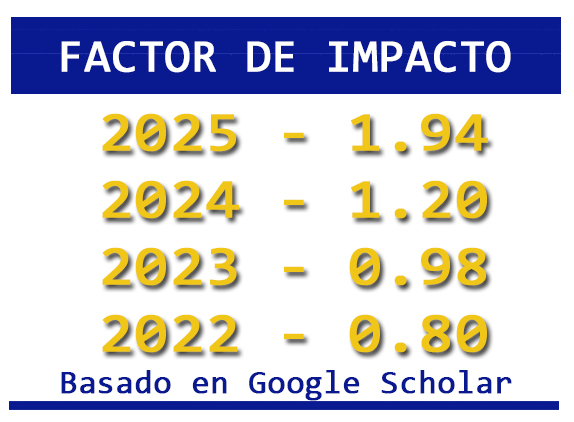Reprogramación del splicing alternativo de genes asociados a cáncer de mama
DOI:
https://doi.org/10.36790/epistemus.v15i30.186Palabras clave:
splicing, cáncer mamario, oligonucleótidos antisentidoResumen
El splicing alternativo es un proceso que modula la expresión génica y contribuye en la diversidad proteica. Sin embargo, se han observado que alteraciones en el splicing alternativo de algunos genes promueve el desarrollo de isoformas oncogénicas en cáncer de mama. Debido a que el cáncer de mama es la neoplasia más frecuente en mujeres y la primera causa de muerte por cáncer. El presente trabajo analiza la expresión de isoformas involucradas en la progresión tumoral y considera ideal el uso de oligonucleótidos antisentido como tratamiento contra cáncer de mama. La información revela que la desregulación de los genes BirC5 y KLF6 se asocia a la inhibición de la muerte celular y metástasis. Además, la existencia de terapias que utilizan oligonucleótidos antisentido es una realidad, tal es el caso del tratamiento utilizado en la atrofia muscular espinal, que ha brindado excelentes resultados a los pacientes que sufren de esta enfermedad.
Descargas
Citas
N. Martinez-Montiel, N. H. Rosas-Murrieta, M. A. Ruiz, E. Monjaraz-Guzman, y R. Martinez-Contreras, “Alternative Splicing as a Target for Cancer Treatment”, Int. J. Mol. Sci., vol. 19, núm. 2, feb. 2018, doi: 10.3390/IJMS19020545.
Q. Yang, J. Zhao, W. Zhang, D. Chen, y Y. Wang, “Aberrant alternative splicing in breast cancer”, J. Mol. Cell Biol., vol. 11, núm. 10, pp. 920–929, may 2019, doi: 10.1093/jmcb/mjz033.
H. K. Kim, M. H. C. Pham, K. S. Ko, B. D. Rhee, y J. Han, “Alternative splicing isoforms in health and disease”, Pflügers Arch. - Eur. J. Physiol. 2018 4707, vol. 470, núm. 7, pp. 995–1016, mar. 2018, doi: 10.1007/S00424-018-2136-X.
H. Dvinge, J. Guenthoer, P. L. Porter, y R. K. Bradley, “RNA components of the spliceosome regulate tissue- and cancer-specific alternative splicing”, Genome Res., vol. 29, núm. 10, p. 1591, 2019, doi: 10.1101/GR.246678.118.
F. Bray, J. Ferlay, I. Soerjomataram, R. L. Siegel, L. A. Torre, y A. Jemal, “Global cancer statistics 2018: GLOBOCAN estimates of incidence and mortality worldwide for 36 cancers in 185 countries”, CA. Cancer J. Clin., vol. 68, núm. 6, pp. 394–424, nov. 2018, doi: 10.3322/CAAC.21492.
Centro Nacional de Equidad de Género y Salud Reproductiva, “Información Estadística Cáncer de Mama | Centro Nacional de Equidad de Género y Salud Reproductiva | Gobierno | gob.mx”, dic. 02, 2016. https://www.gob.mx/salud/cnegsr/acciones-y-programas/informacion-estadistica-cancer-de-mama (consultado oct. 01, 2021).
IMSS, “Cáncer de Mama”. http://www.imss.gob.mx/salud-en-linea/cancer-mama (consultado dic. 08, 2020).
J. Gaytan-Cervantes, C. Gonzalez-Torres, V. Maldonado, C. Zampedri, G. Ceballos-Cancino, y J. Melendez-Zajgla, “Protein Sam68 regulates the alternative splicing of survivin DEx3”, J. Biol. Chem., vol. 292, núm. 33, pp. 13745–13757, ago. 2017, doi: 10.1074/jbc.M117.800318.
M. Bhadra, P. Howell, S. Dutta, C. Heintz, y W. B. Mair, “Alternative splicing in aging and longevity”, Hum. Genet. 2019 1393, vol. 139, núm. 3, pp. 357–369, dic. 2019, doi: 10.1007/S00439-019-02094-6.
S. Park et al., “Differential Functions of Splicing Factors in Mammary Transformation and Breast Cancer Metastasis”, Cell Rep., vol. 29, núm. 9, p. 2672, nov. 2019, doi: 10.1016/J.CELREP.2019.10.110.
M. Fahad Ullah, “Breast Cancer: Current Perspectives on the Disease Status”, Adv. Exp. Med. Biol., vol. 1152, pp. 51–64, 2019, doi: 10.1007/978-3-030-20301-6_4.
Z. Xiping, W. Qingshan, Z. Shuai, Y. Hongjian, y D. Xiaowen, “A summary of relationships between alternative splicing and breast cancer”, Oncotarget, vol. 8, núm. 31. Impact Journals LLC, pp. 51986–51993, feb. 07, 2017, doi: 10.18632/oncotarget.17727.
K. Inoue y E. A. Fry, “Aberrant Splicing of Estrogen Receptor, HER2, and CD44 Genes in Breast Cancer.”, Genet. Epigenet., vol. 7, núm. 7, pp. 19–32, ene. 2015, doi: 10.4137/GEG.S35500.
N. Fuentes y P. Silveyra, “Estrogen receptor signaling mechanisms”, Adv. Protein Chem. Struct. Biol., vol. 116, p. 135, ene. 2019, doi: 10.1016/BS.APCSB.2019.01.001.
N. Martínez-Montiel, M. Anaya-Ruiz, M. Pérez-Santos, y R. D. Martínez-Contreras, “Alternative splicing in breast cancer and the potential development of therapeutic tools”, Genes, vol. 8, núm. 10. MDPI AG, p. 217, oct. 06, 2017, doi: 10.3390/genes8100217.
D. Wiener et al., “BRCA1 and BARD1 colocalize mainly in the cytoplasm of breast cancer tumors, and their isoforms show differential expression”, Breast Cancer Res. Treat. 2015 1533, vol. 153, núm. 3, pp. 669–678, sep. 2015, doi: 10.1007/S10549-015-3575-0.
N. Tian, J. Li, J. Shi, y G. Sui, “From general aberrant alternative splicing in cancers and its therapeutic application to the discovery of an oncogenic DMTF1 isoform”, Int. J. Mol. Sci., vol. 18, núm. 3, p. 191, mar. 2017, doi: 10.3390/ijms18030191.
J. Li et al., “Mechanisms regulating DMTF1β/γ expression and their functional interplay with DMTF1α”, Int. J. Oncol., vol. 58, núm. 1, p. 20, ene. 2021, doi: 10.3892/IJO.2020.5146.
V. Hart, M. Silipo, S. Satam, H. Gautrey, J. Kirby, y A. Tyson-Capper, “HER2-PI9 and HER2-I12: two novel and functionally active splice variants of the oncogene HER2 in breast cancer”, J. Cancer Res. Clin. Oncol., vol. 147, núm. 10, p. 2893, oct. 2021, doi: 10.1007/S00432-021-03689-1.
Z. Xiping, W. Qingshan, Z. Shuai, Y. Hongjian, y D. Xiaowen, “A summary of relationships between alternative splicing and breast cancer”, Oncotarget, vol. 8, núm. 31, p. 51986, feb. 2017, doi: 10.18632/ONCOTARGET.17727.
S. E. Syafruddin, M. A. Mohtar, W. F. W. M. Nazarie, y T. Y. Low, “Two Sides of the Same Coin: The Roles of KLF6 in Physiology and Pathophysiology”, Biomolecules, vol. 10, núm. 10, pp. 1–22, oct. 2020, doi: 10.3390/BIOM10101378.
I. Sušac et al., “Polymorphisms in Survivin (BIRC5 Gene) Are Associated with Age of Onset in Breast Cancer Patients”, J. Oncol., vol. 2019, 2019, doi: 10.1155/2019/3483192.
J. Dai et al., “Identification of prognostic significance of BIRC5 in breast cancer using integrative bioinformatics analysis”, Biosci. Rep., vol. 40, núm. 2, 2020, doi: 10.1042/BSR20193678.
S. Khan et al., “Early diagnostic value of survivin and its alternative splice variants in breast cancer”, BMC Cancer, vol. 14, núm. 1, pp. 1–10, mar. 2014, doi: 10.1186/1471-2407-14-176.
D. Trnski et al., “Regulation of Survivin Isoform Expression by GLI Proteins in Ovarian Cancer”, Cells, vol. 8, núm. 2, p. 128, feb. 2019, doi: 10.3390/CELLS8020128.
K. Xue y R. E. MacLaren, “Antisense oligonucleotide therapeutics in clinical trials for the treatment of inherited retinal diseases”, https://doi.org/10.1080/13543784.2020.1804853, vol. 29, núm. 10, pp. 1163–1170, oct. 2020, doi: 10.1080/13543784.2020.1804853.
K. Takakura, A. Kawamura, Y. Torisu, S. Koido, N. Yahagi, y M. Saruta, “The Clinical Potential of Oligonucleotide Therapeutics against Pancreatic Cancer”, Int. J. Mol. Sci., vol. 20, núm. 13, jul. 2019, doi: 10.3390/IJMS20133331.
D. R. Scoles, E. V. Minikel, y S. M. Pulst, “Antisense oligonucleotides: A primer”, Neurol. Genet., vol. 5, núm. 2, p. 323, abr. 2019, doi: 10.1212/NXG.0000000000000323.
V. Sardone, H. Zhou, F. Muntoni, A. Ferlini, y M. S. Falzarano, “Antisense Oligonucleotide-Based Therapy for Neuromuscular Disease”, Mol. A J. Synth. Chem. Nat. Prod. Chem., vol. 22, núm. 4, abr. 2017, doi: 10.3390/MOLECULES22040563.
J.-P. Brosseau et al., “Redirecting splicing with bifunctional oligonucleotides”, Nucleic Acids Res., vol. 42, núm. 6, p. e40, 2014, doi: 10.1093/NAR/GKT1287.
M. Mogilevsky et al., “Modulation of MKNK2 alternative splicing by splice-switching oligonucleotides as a novel approach for glioblastoma treatment”, Nucleic Acids Res., vol. 46, núm. 21, p. 11396, nov. 2018, doi: 10.1093/NAR/GKY921.
O. J. D’Cruz, S. Qazi, L. Hwang, K. Ng, y V. Trieu, “Impact of targeting transforming growth factor β-2 with antisense OT-101 on the cytokine and chemokine profile in patients with advanced pancreatic cancer”, Onco. Targets. Ther., vol. 11, p. 2779, may 2018, doi: 10.2147/OTT.S161905.
Publicado
Cómo citar
Número
Sección
Licencia
Derechos de autor 2021 EPISTEMUS

Esta obra está bajo una licencia internacional Creative Commons Atribución-NoComercial-SinDerivadas 4.0.
La revista adquiere los derechos patrimoniales de los artículos sólo para difusión sin ningún fin de lucro, sin menoscabo de los propios derechos de autoría.
Los autores son los legítimos titulares de los derechos de propiedad intelectual de sus respectivos artículos, y en tal calidad, al enviar sus textos expresan su deseo de colaborar con la Revista Epistemus, editada semestralmente por la Universidad de Sonora.
Por lo anterior, de manera libre, voluntaria y a título gratuito, una vez aceptado el artículo para su publicación, ceden sus derechos a la Universidad de Sonora para que la Universidad de Sonora edite, publique, distribuya y ponga a disposición a través de intranets, internet o CD dicha obra, sin limitación alguna de forma o tiempo, siempre y cuando sea sin fines de lucro y con la obligación expresa de respetar y mencionar el crédito que corresponde a los autores en cualquier utilización que se haga del mismo.
Queda entendido que esta autorización no es una cesión o transmisión de alguno de sus derechos patrimoniales en favor de la mencionada institución. La UniSon le garantiza el derecho de reproducir la contribución por cualquier medio en el cual usted sea el autor, sujeto a que se otorgue el crédito correspondiente a la publicación original de la contribución en Epistemus.
Salvo indicación contraria, todos los contenidos de la edición electrónica se distribuyen bajo una licencia de uso y Attribution-NonCommercial-ShareAlike 4.0 International (CC BY-NC-SA 4.0) Puede consultar desde aquí la versión informativa y el texto legal de la licencia. Esta circunstancia ha de hacerse constar expresamente de esta forma cuando sea necesario.
















